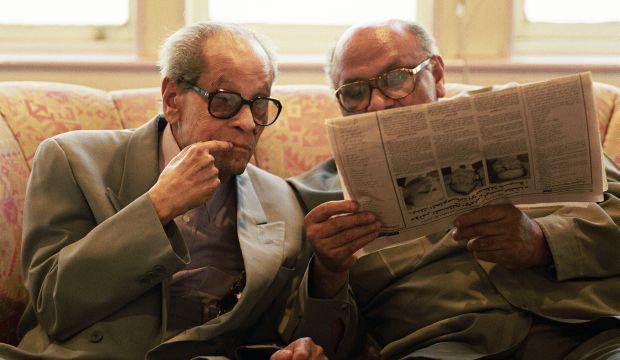
Egyptian author Naguib Mahfouz (L) wrote the highly-acclaimed Cairo Trilogy. (Ulf Andersen/Getty Images)
London, Asharq Al-Awsat—Well-known Egyptian writer Ahmed Khaled Towfik once wrote: “In fact, people in Egypt are fortunate. They do not need to read horror fiction in order to rehearse death. Horror—particularly its worst kind: fear of tomorrow—is a permanent sojourner with them.”
It is pitiful that a literary writer would shrug off an entire genre. But what makes this statement too ironic to be taken seriously is that it comes from one of the Arab world’s most prolific science fiction and horror writers. Many Arab writers and readers would still take Towfik’s statement at face value: after all, they would argue, why bother imagine the future, let alone a dystopian version of it, when the present is in such a woeful state?
Perhaps this attitude explains why the future has rarely been a subject for Arab writers—save for some exceptions—ever since the publication of Naguib Mahfouz’s masterpiece The Cairo Trilogy (1956-57). In the majority of Arabic works of fiction, the plot smoothly glides in one of two directions: the past or the present; or it vacillates between them.
However, Iraqi writers may be set to blaze a trail. In a much-awaited move, Comma Press, a UK publisher, has commissioned Iraqi writer Hassan Blasim to edit a short story anthology, Iraq + 100. The collection will feature ten short stories written by Iraqi writers and set in Iraq in the year 2103, exactly a hundred years after the 2003 US-led invasion of the country.
Each story should not exceed 6,000 words and must be set in one of 22 cities in Iraq and the semi-autonomous Iraqi Kurdistan. Writers are required to imagine life in one particular city and present a complete human story, Comma Press says on its website. Contributors should not limit themselves to science fiction; rather they are free to choose any literary genre that relates to the future. The book is promising and, if it goes to press, will make a valuable addition to the realism-dominated Arabic literary scene.
But the dearth of Arabic futuristic fiction begs a question: is the Arabic literary imagination sufficiently well-equipped to be up to the challenge? If the answer is “yes,” what accounts for the absence of an Arabic speculative fiction in the last 50 years or so? In other words, do Arab literary writers have what it takes to write original Arabic futuristic fiction, without relying heavily on a mainly Western legacy?
Indeed, speculative fiction is not entirely new to Arabic literature. Several 19th and 20th century Arab literary figures, such as the Syrian Francis Marrash and the Egyptian Tawfiq Al-Hakim, spring to mind as examples of writers who tackled contemporary political issues through speculative fiction.
Blasim, who has won the 2014 Independent foreign fiction prize for his The Iraqi Christ, appears to be aware of the challenge.
“Writing about the future is a new type of writing for Iraqi literature. Therefore, writers need to research and explore more in order to develop certain ideas and perceptions through storytelling,” Blasim told Asharq Al-Awsat via e-mail.
At the same time, the exiled Iraqi writer seems to be passionate about his futuristic project and his tone smacks of the enthusiasm of a scientist witnessing the emergence of a new phenomenon.
“Writing about an almost unknown life that is not based on your past or present experience is both wonderful and exciting. [It is] an attempt at understanding ourselves, our fears and hopes by means of breaking the chains of time. [It is] as if you are dreaming of the fate of man,” he added.
Blasim, whose debut collection The Madman of Freedom Square was hailed for its shocking and transgressive imagery, describes Iraq + 100 as a “little project” designed to spice up the largely uniform Arabic literary scene. “Just as we lack diversity and transparency in our life in general, we worship the single form and single idea!” the 41-year-old writer lamented.
However, speculating about the future is not without its challenges. JG Ballard, the British writer who is credited with initiating the New Wave in Science Fiction, argued that the genre is the “sole form of literature . . .that looks forward.” With the majority of contemporary Arabic literary output stuck in the past or the present, using mainly “backwards-looking” characters—to use another of Ballard’s terms— it is not going to be easy for writers of Iraq + 100 to make the shift to the future.
Blasim agrees that a thorough overhaul of literary techniques is much needed, not the least of which is forgoing the flowery language that needlessly decorates much of the oeuvre of contemporary Arabic writers.
He said: “Imagining life after a hundred years does not need one to lean on poetic language or their own personal experience; rather one should take their imagination to new shores.” Despite the warm reception of his work in the West, Blasim has been much maligned for his “foul language” and his books were banned in several Arab countries for that reason.
Arab critics are particularly fond of writers’ linguistic skills. This has rendered Arabic fiction pretty much an arena for linguistic muscle-flexing. But Blasim seems intent to break this habit: “I’m not interested in preserving ‘the beauty of Arabic language’,” he said in late 2012 during the Newcastle launch of The Iraqi Christ.
Projects like Iraq + 100 should be embraced. And young Arab writers should be encouraged to speculate about the future of a region constantly reshaped by conflict. They need to write about what Towfik said they fear most: tomorrow. The failure of Arab writers to produce futuristic fiction has been a mystery. The Arab intellectual and political scene, blighted with much repression and censorship, makes for an ideal environment to write about the future, a realm void of the political and religious taboos of the past and the present.

Trackbacks/Pingbacks